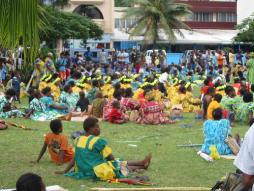Imagine an industry conference of IP communciations where coders are mashing up an SMS application for a small NGO researching best practices for poverty alleviation. We were curious about what that might look like, so MobileActive.org is at the annual VON conference, the industry gathering of IP communications firms. At its unconference-style Innovation Track, there will be gathering of coders producing an SMS platform for an NGO focused on evaluating poverty alleviation efforts in developing countries. The mashup sponsored by the Thomas Howe Company, a Voice over IP (VOIP) communications firm that focuses on mashups for the enterprise.
We published a recent call for submission of use cases when we first learned about this effort. While typically these kind of 'volunteer coding' projects lack in long-term sustainability and enterprise-level scaling, we are interested in seeing what will become of this mobile text-to-speech platform that will be used in evaluating microfinance loan offerings in the Phillippines and South Africa.
Innovations in Poverty Action is small research outfit that is focused on evaluation and innovations in poverty alleviation in developing countries. The organization, supported by the Financial Access Initiative and affiliated with several major American Universities, is keen on establishing with rigorous research what works in poverty alleviation and what doesn't, and to gather robust evidence about whether the latest fads in the poverty industry actually raise people's living standards or are just that - a fad.
Says Dean Karlan, a senior staffer at Poverty Action: "In the medical sciences we would never think of taking or selling a drug that was not tested thoroughly. It ends up being an ethical argument: why should we lower our standards in fighting poverty. We need better evidence where to put the money. Microfinance is a field where we are strikingly void of knowing what works and what doesn't."
Microfinance, a loan and credit lending system for very small entrepreneurs in countries around the world, is currently widely popular as a poverty alleviation strategy. Its premise is that access to credit, capital, and insurance products for micro-businesses can be good to jumpstart enterprise and increased earnings for very low-income individuals -- if done well.
Yet, the field has been criticized for exceedingly high interest rates that can range from 20-90% for loans. Such practices are those of loan sharks in Western countries and generate social outrage, and yet, Karlsen argues, Western donors get charitable deductions when contributing to NGO microfinance institutions (MFIs). While MFIs argue that sustainability is a key concern that requires them to charge high rates and that any loan that charges less than a local money ender is good, it is unclear what interest rates are actually required for sustainability AND social impact, how individuals are selecting for specific products, what the right combination of products is, and what the difference in demand is for different loan products for micro entrepreneurs.
Poverty Action wants to determine in two countries whether the MFI mantra that demand for micro credit is not affected by the interest rate is really true by doing a set of randomized evaluations where data is collected cleanly in the field.
The mashup will conduct social marketing via SMS in the field. Loan officers, going from village to village, testing different loan packages and offers that are delivered and returned via text message. This will enable the participating MFIs to determine whether if interest rates, for example, are lowered by a certain percentage, existing clients would borrow more, so many new loans would come in, net revenue would stay the same, or go down if clients are indeed price sensitive to the loan rate. It will also enable MFIs to determine whether different packages will change who is being reached and whether poor individuals are taking advantage of loans at different rates than very poor people. Tracking individual clients over time then wil determine social impact and revenue generation over time.
The SMS application will randomize specific offers that the loan officer in the field receives via text message and allow information about the uptake be texted back. Currently, Poverty Action is using PDAs for a similar project but want to move to a platform powered by SMS and mobiles to make transmission of data easier. The mashup coders at the conference are developing the prototype for this application here at VON. We will keep you posted
Eventually and if this pilot proves successful, Poverty Action will trial a credit scoring system to better understand the risks for different borrowers with mobile phones used to text information back to the MFI for an immediate decision. It may even be possible to then transfer funds right away to the borrower via mobile payment.
The coding will go under way later this afternoon and we will keep readers posted what develops.
Photo courtesy of Brainsnorkel.


Post new comment